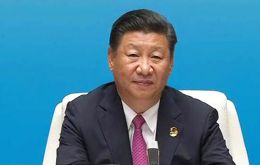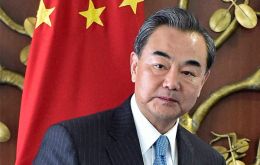MercoPress. South Atlantic News Agency
Tag: China
-
Thursday, October 19th 2017 - 06:57 UTC
China has entered a “new era” and should “take centre stage in the world”, Xi announces

China has entered a “new era” where it should “take centre stage in the world”, President Xi Jinping says. The country's rapid progress under “socialism with Chinese characteristics” shows there is “a new choice for other countries”, he told the Communist Party congress.
-
Wednesday, October 18th 2017 - 08:28 UTC
China's credit rating downgraded by S&P, “but might still be too good”

China's credit rating has been downgraded by Standard & Poor's (S&P) because of worries over the rapid buildup of debt in the country. S&P cut China's rating by one notch from AA- to A+, saying its debts had raised “economic and financial risks”.
-
Tuesday, September 12th 2017 - 09:21 UTC
Brazil's air commercial industry considers building a factory in China

Brazilian aeronautical company Embraer plans to analyze the possibility of building a factory in China to manufacture jet aircraft for the commercial aviation segment, the company’s chief executive said.
-
Tuesday, September 5th 2017 - 08:47 UTC
Kim Jong un is challenging Donald Trump or Xi Jinping?

North Korea's display of missiles and nuclear weapons seems more directed to challenge Xi Jinjping's China than United States and president Donald Trump. In effect the timing of events seems to indicate Pyongyang is clearly on tack to disappoint and embarrass Beijing.
-
Thursday, August 31st 2017 - 07:24 UTC
Ecuador sentences 20 Chinese fishermen for poaching; Beijing cautious about how to react

Overfishing has given rise to a diplomatic trouble between China and Ecuador. In mid-August, Ecuador detained a Chinese vessel in the Galapagos Islands and found 6.600 sharks on board. The 20 Chinese fishermen have been sentenced up to four years for illegally fishing and to pay US$ 5.9 million.
-
Friday, August 25th 2017 - 14:17 UTC
Strong message to trademark infringements in China: New Balance wins case against local shoemakers

New Balance has won a record payout in a Chinese trademark case after three local shoemakers were found to have infringed the brand's “N” logo. A Chinese court awarded the US sportswear firm more than 10 million Yuan (US$1.5m).
-
Tuesday, August 22nd 2017 - 06:23 UTC
Chinese automaker “deeply interested” in buying Jeep from Fiat Chrysler

A Chinese automaker is “deeply interested” in buying Jeep, an iconic American brand, from Fiat Chrysler Automobiles in a move that likely would face political opposition in the U.S. and create angst among workers. Great Wall Motor told trade publication Automotive News it also has “indirectly expressed interest” in acquiring the brand known for its rugged, off-road vehicles.
-
Tuesday, August 15th 2017 - 15:44 UTC
Trump orders review of China's practices regarding intellectual property; Beijing warns it “will not sit idle”

President Donald Trump has asked his country's top trade official to review China's practices regarding intellectual property. The move was incremental, but could eventually lead to the US imposing trade sanctions.
-
Thursday, August 3rd 2017 - 07:53 UTC
Beijing support for Maduro: “the election was generally held smoothly”

Venezuela's close ally China said it believed voting in the country's Constituent Assembly election was “generally held smoothly”, brushing off widespread condemnation from the United States, Europe and others and evidence of voting irregularities.
-
Tuesday, July 25th 2017 - 03:40 UTC
Repsol caught in the middle of the Hanoi/Beijing South China Sea powder keg

Vietnam has ordered a Spanish private company conducting a gas-drilling expedition in a disputed area of the South China Sea to cease operations following military threats from China, according to reports.
